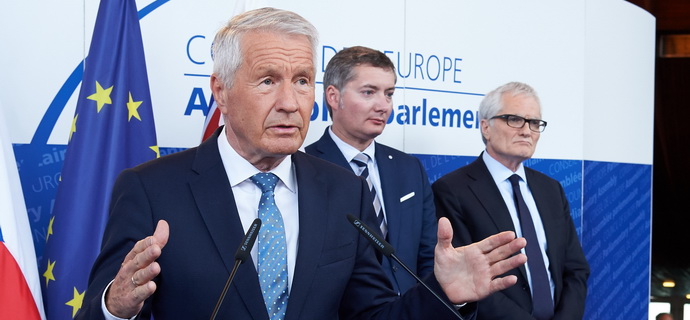"I heard very emotional arguments, even anger [about the attempts to 'forgive Russia' - ed]. There were constructive arguments as well. But we see that there will be no votes. So I propose postponing the discussion until January," she explained.This means that Russian delegation will remain under sanctions for at least a year. The Ukrainian delegation saw the vote as a victory. However, the victory is for the battle, not the war.
The push to return Russia to PACE
Last year, under Russian pressure, PACE started the process of reassessing its own procedures. The delegates were ready to limit themselves so that the Russian delegation would return to the assembly.In 2017, Russia exacerbated the crisis by stopping paying their membership fees to the budget of the entire Council of Europe and warned that they could stop recognizing its other organs such as the European Court of Human Rights, members of which are elected currently without the participation of the Russian delegation.
The Russians demanded they return without the threat of sanctions being renewed, without implementing any of PACE's demands - at least seven resolutions calling upon Russia to deoccupy Crimea and get out of eastern Ukraine. Then Russia would resume payments to the Council of Europe - €33 mn annually; or 7% of the CoE budget. And stop threatening the Council of Europe with Russia's complete withdrawal from the institution - a red line for European diplomats.To make this happen, the very possibility of sanctioning delegations had to be canceled or significantly complicated - which is what the resolution aimed to achieve.
Up till 8 October, Russia's arguments were persuasive, Sydorenko writes. At the closed meeting of the Joint Committee, which gathered key representatives from both PACE and the second wing of the Council of Europe, the Council of Ministers, Russia's representative Ivan Soltanovsky had convinced the vast majority of ambassadors that if PACE would change its own regulations and complicate the sanctions mechanism, this would be a good step, but it still left a crack for the possibility to apply sanctions on Russia. More radical measures should follow: sanctions should be canceled, PACE delegates shouldn't have any levers for applying sanctions; all limitations should be approved by the ambassadors of 47 member countries; Russia should be included in the process. Otherwise, "the future of the Council of Europe is in question, and I am not bluffing," Soltanovsky said, hinting that Russia was considering withdrawing from Europe's largest human rights organization.The legal note which broke the camel's back

Trending Now
Read more: How PACE wants to change its rules to lift sanctions on Russia
Up till the day of the vote on 9 October, the outcome was difficult to predict."Are we some kind of goofs? He's telling us: go play with your toys, but, actually, you are nobody in PACE and have no authority in PACE. What kind of attitude is that?" is how one of Ukraine's friends described the situation to European Pravda.An unexpected outcome of the vote is that, for the first time, the issue of whether Russia should be excluded from the Council of Europe was laid on the table.
"They have no place in our ranks"
Russia's harshest critics in PACE belong to two parties - the liberals and conservatives. This time was no exception. Mart van de Ven from The Netherlands, who presented the liberals' position, was the first to state: Russia's threats to leave the Council of Europe could become a reality, but this should not stop PACE from prolonging sanctions.
"And the fact that Russia does not engage in dialogue, does not take steps towards this, does not send a good signal in this context," he added.Olivier Becht, his liberal colleague from France, developed this idea:
"If we vote against [changes to the sanctions procedure], we will push Russia to withdraw from the Council of Europe. And this will be a catastrophe. If we vote for it, then we will tell Russia: what it does can be forgiven. And this is also a catastrophe because it's impossible to imagine something worse than what Russia has done in Ukraine," he said and reminded about Churchill's quote that if one chooses between dishonor and war, whoever chooses dishonor will also receive war.The British conservatives and Laborists were even franker: they openly spoke about Russia crossing a red line, and its membership status in the Council of Europe has become quite urgent.
Angela Smith, who represents the group of British socialists, started by saying that Russia had played the blackmail game for too long. "I will not be intimidated. Such countries [as Russia] should not be in our ranks!"Supporters of Russia's exclusion from the Council of Europe were found also in Iceland. Sunna Ævarsdóttir, a delegate from Iceland socialists, called upon her colleagues to not hide from reality.
"Maybe it's time to part ways with the Russian delegation? This would be more honest. It would be right to discuss if Russia could be a member of this club in the first place, and this dialogue should be held at all levels in the Council of Europe," she explained.In any case, the question of PACE's sanctions on Russia won't be actual in 2019. And in the meantime, a discussion could be held about Russia's place in the Council of Europe.
Read also:
- Russia ignores PACE resolutions to end aggression against Ukraine. So PACE prepares to lift sanctions
- CoE Secretary General Jagland now openly lobbies for return of Russian delegation
- Russia’s attempt to return to PACE: all you need to know

